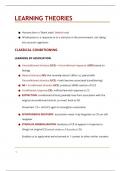Summary
Summary classical conditioning theory, research & evaluation
- Module
- Unit 4 - Learning theories
- Institution
- PEARSON (PEARSON)
a diagram of how classical conditioning works, Aims, Porcedure, Results & Conclusion of research for classical conditioning Evaluation (SCOUT) psychological terminology highlighted
[Show more]



